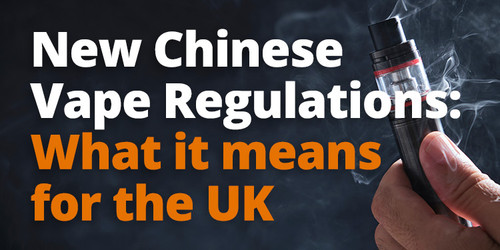New Chinese Vape Regulations: What it means for the UK
Published by James Dunworth
The Chinese government has amended a key tobacco law: Regulations for the Implementation of the Tobacco Monopoly Law of China. This brings vaping into Chinese tobacco legislation. In China, it means a ban on non-tobacco flavoured vape juices/e-liquids along with a multitude of other restrictions, but it also has implications for the vape industry in the UK.
Here you’ll find a summary of the measures (particularly in relation to export) and a look at what it might mean for the UK vape industry and retailers.
What are the key measures?
There is currently a lot of uncertainty around the exact measures, despite lots of work by the Independent British Vape Trade Association (IBVTA) and, indeed, our own lawyers. What we do know (or think we know) is that:
Manufacturers will need to obtain a licence. However, it is unclear whether a licence will need to be obtained in order to export. The common understanding in the UK and from our own lawyers in Hong Kong, is that a licence will be required, and that’s what I’ve heard from Chinese manufacturers and the sources in the UK. However, China Briefing states that regulations will be looser when devices are made for export and that a licence will not be required.
A licence will also be needed to import non-Chinese e-liquid into the country. While we wait for the legislation to come into effect, UK companies that export e-liquid to China (typically for filling into pods) need to ensure the export is kept on record with the Ministry of Commerce in China.
Again, there isn’t a lot of clarity around what is needed to obtain a licence, although we do know the regulations require companies to demonstrate they have sufficient funds and technology to produce vape devices. You can also see a summary of the requirements for a licence on the National Review.
Vaping devices and e-liquid need to comply with the law of the destination country. This means that products exported to the UK would need to be compliant with the European Tobacco Products Directive II.
Packaging needs to comply with national regulations. It’s not quite clear yet what this means for exporters, but it does appear that brands exported from China will need to have that brand registered as a trademark in China.
E-Cigarette investment will be limited. China Review reports that foreign investment will be prohibited, at least pending a review, and that investment into production facilities will be managed. If this also applies to manufacturing for export, this could limit the ability of Chinese manufacturers to respond to changes in demand and trends.
When does it come into place?
The regulations came into force in May 2022, but businesses have until September 2022 to comply.
What does it mean for the industry?
A possible reduction in non-compliant products. If enforced, the requirement that products are compliant with the laws of destination countries could mean that fewer non-compliant products are exported. That could mean, for example, that there is a reduction in the supply of disposable devices with more than 5ml capacity. It could also mean a reduction in supply to countries where vaping is banned, such as Australia.
Alternatively, it might mean that production goes underground, and that the quality of those illegal products gets worse.
Possible reduction in supply.We don’t yet know how difficult it will be to obtain the licence. If companies need to obtain the licence to export, and the process is difficult, it could reduce the supply of devices to the UK, especially in the short term.
Competition and investment could be reduced. The combination of additional regulations and limits on investment could reduce the amount of companies in the Chinese vape industry. It could also limit the amount of funds invested into R&D, leading to a reduction in the volume of new devices being produced and reduced innovation.
Manufacturing could spread to other countries. Wages and costs are a lot higher in China than they were a few years ago. It is possible that additional regulation could encourage companies to look to other countries for manufacture. Some manufacturing has already moved after the EU TPD was brought in, so there is precedent here.
Wrapping up
The vape industry is no stranger to disruption. While the lack of clarity over the regulations do not help, the industry will probably adapt - or move! - in order to ensure continued supply and innovation. In the short term, though, vape companies need to stay abreast of changes - and be ready for some short term disruption.
Related Posts
UK Vape Tax: A Retailer's Guide
Vape Age Restrictions Guide

